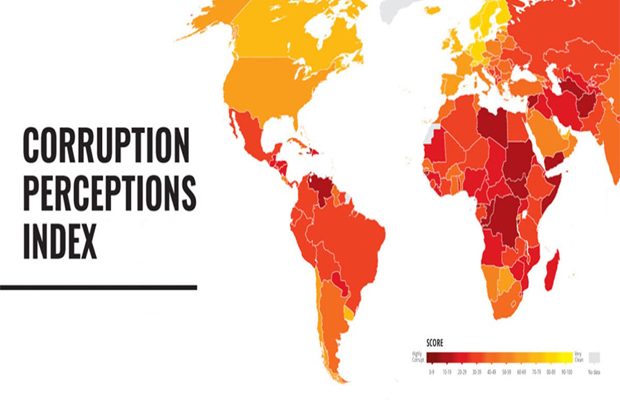Countries in Europe and Oceania reign supreme in the latest global Corruption Perceptions Index (CPI) released by Transparency International (TI), with Ghana maintaining its 72nd position in the ranking of 180 countries and territories.
The country obtained 43 out of a possible clean score of 100, tying with Benin, Senegal and South Africa, a statement released on Tuesday by the Ghana Integrity Initiative (GII) said, noting that Ghana for the third consecutive year, has scored 43.
Denmark has taken the top rank with a score of 90, followed by Finland and New Zealand, a score of 87 apiece, with strong democratic institutions and regard for human rights also making these countries some of the most peaceful in the world, according to the Global Peace Index.
According to the statement, the least performing countries are Somalia (12), Syria (13) and South Sudan (13).
“They are all enveloped in protracted conflicts. Years of violence and war have decimated resources and left them vulnerable to corruption, leaving governments essentially incapable of making any progress,” it stated.
SSA
The statement indicated that in Sub-Saharan Africa (SSA), the 2022 CPI shows a “dire situation as most countries, including Ghana have failed to make progress in reducing corruption.”
The top performers in the region are Seychelles (70), followed by Cabo Verde (60), Botswana (60) and Rwanda (51), whereas Burundi (17), Equatorial Guinea (17), South Sudan (13) and Somalia (12) have the lowest scores.
In terms of trends, the 2022 CPI revealed that from 2012 to 2022, a total of 25 countries significantly improved their scores.
“The SSA region recorded the highest percentage of countries (28% – 7 out of 25); Angola, Cote d’Ivoire, Ethiopia, Kenya, Senegal, Seychelles and Tanzania experiencing significant improvements in their scores. Conversely, 31 countries significantly declined in their scores since 2012.
“SSA represents 10% (3 out of the 31 countries – Lesotho, Liberia and Mali) of countries with significant declines in their scores,” the statement added.
Since 2017, 10 countries significantly declined on their CPI scores, and they were named as Luxembourg (77), Canada (74), United Kingdom (73), Austria (71), Malaysia (47), Mongolia (33), Pakistan (27), Honduras (23), Nicaragua (19) and Haiti (17).
On the other hand, eight countries, which improved on the CPI during the same period, are Ireland (77), South Korea (63), Armenia (46), Vietnam (42), the Maldives (40), Moldova (39), Angola (33) and Uzbekistan (31).
Corruption, Conflict and Security
Transparency International said corruption, conflict and security are profoundly intertwined, and that the misuse, embezzlement or theft of public funds can deprive the very institutions of resources they need to fulfil their mandate which include protecting citizens, enforcing the rule of law and safeguarding peace.
“In Ghana, corruption continues to negatively affect citizens’ trust in government and institutions, hinders the provision of essential services, impedes economic development and creates vulnerabilities that have the tendency of being exploited by extremists.
“Corruption, if not addressed, has a potential to lead to social unrest and conflict. As such, it is essential that steps are taken to combat corruption in order to ensure a more peaceful and secure society,” it posited.
Recommendations
The GII recommended for relevant state agencies to start addressing security vulnerabilities and protect the country against external threats, as a tramway to address the problem of corruption in Ghana.
“This should include measures such as strengthening the defence sector, increasing intelligence and security capabilities, and controlling the perceived politicisation of enlistment/employment,” the statement said.
It continued that strengthening the professionalism of the defence sector and improving border security to counter smuggling, illicit trade and potential terrorist activities, were the way to go.
The GII also said the government must promote economic development and reduce barriers to investment.
“This includes the implementation of effective monetary and fiscal policies and the creation of a transparent environment in the public and private sectors where corrupt practices are easily identified and addressed more effectively,” the statement added.
It also wants the executive to urgently take steps to lay the Conduct of Public Officers’ Bill in Parliament, while calling on the legislature to attach equal level of urgency to its timely passage.
“Parliament should ensure implementation of recommendations contained in the Auditor General’s report by referring it to the Attorney General to recover lost funds and prosecute persons found culpable to have engaged in fraud, misapplication or embezzlement of state resources,” the statement noted.
By Ernest Kofi Adu

